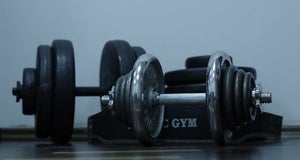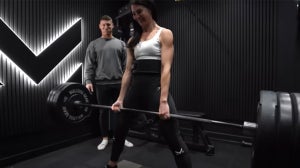HIIT (high-intensity interval training) workouts seem to be flavour of the month in the world of fitness — and it’s not hard to see why. Exercise that you can slot into a busy schedule is invaluable, and for many, 20 minutes of intense activity is much easier to stomach than committing to an hour of steady-state cardio.
Before diving head first into the deep end though, it’s important that you’re properly prepared and wary of making the following common mistakes. We caught up with Abigail Stacey (@workoutwabi_powerlifter), a physiologist at Nuffield Health with a Sport and Exercise Science B.Sc., to get her top tips.
Getting HIIT right won’t just boost your results, but could help prevent injury too.

1. Check you’re ready for it
Before you even begin your chosen HIIT workout, Abigail recommends -checking that you’re in a fit state to take on the challenge.
“You should be able to sustain 65-75% of your maximum heart rate for 30 minutes before you start HIIT. This can be predicted through the calculation of 220 minus your age, e.g if you’re a 25-year-old, your maximum heart rate will be around 220 — 25 = 195.”
It’s also essential that you take the time to warm up before you begin.
2. Less is more
The point of a HIIT workout is that you’re working your body intensely for short periods of time. A general rule of thumb to go by is a 3:1 ratio of exercise to rest, for example, 45 seconds of jumping jacks, followed by 15 seconds recovery. And you shouldn’t do more than 30 minutes of these intervals.
“The maximum time for HIIT can vary from 4 minutes (such as Tabata training), to 15 minutes, with 30 minutes being the maximum recommended duration. Anything above 30 minutes can increase risk of injury, and it’s much better to work harder for less time.”
3. Don’t overdo it
Following on from the above point, you should give your body proper rest between HIIT workouts. It might be tempting to complete a HIIT session every day of the week as it’s so easy to fit into your routine and doesn’t feel like a very long time to be working out, but you have to give your muscles time to recover.
“2-3 sessions of HIIT a week are sufficient, and if you have 24 hours’ rest between sessions the body will recover and you’ll lessen your risk of injury.”
Not allowing for this recovery time may actually slow down your results in the long run — and no one wants to be doing burpees for nothing!
4. Get the timing right
Exercising any time of the day is great, right? Well, maybe not. According to Abigail, you could get more from your workout depending on when you do it.
“HIIT in the morning raises the thermogenic effect in the body which increases the duration of time you burn calories throughout the day. HIIT late at night can make it harder for you to get to sleep as it wakes the body up — it’s recommended to do more relaxation-based exercise in the evening, such as yoga or Pilates.”
Sounds like it could be more worthwhile to set your alarm twenty minutes earlier in the morning, rather than squeezing your HIIT session in after dinner.
5. Don’t run on an empty tank
As with all exercise, you can get more from your body if you’ve filled it with the right fuel beforehand — and afterwards too, to help with recovery. That being said, it’s probably not wise to be jumping about on a full stomach, so make sure you time your nutrient intake so that you’ve had a chance to properly digest everything.
Eating carbs after a HIIT workout is important, as your muscle glycogen stores will have been depleted by the intense activity.

Take Home Message
With all this in mind, you should be set to smash your next HIIT session! While you shouldn’t be pushing yourself to dangerous levels, this type of training is supposed to test your body’s limits — so if you’re not thoroughly out of breath and very sweaty by the end, you’re definitely not going hard enough.
Our articles should be used for informational and educational purposes only and are not intended to be taken as medical advice. If you're concerned, consult a health professional before taking dietary supplements or introducing any major changes to your diet.
Lauren is an English Literature graduate originally from the South. She’s always loved swimming, has discovered the power of weight training over the past few years, and has lots of room for improvement in her weekly hot yoga class.
On the weekends she’s usually cooking or eating some kind of brunch, and she enjoys trying out new recipes with her housemates – especially since shaking off student habits, like mainly surviving off pasta. Above all, she’s a firm believer in keeping a balance between the gym and gin.
Find out more about Lauren’s experience here.








